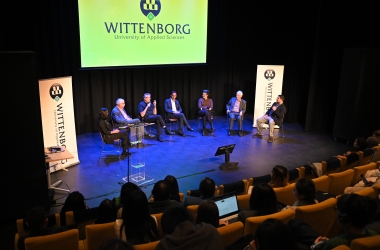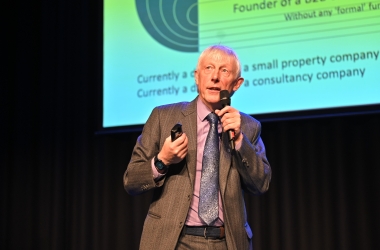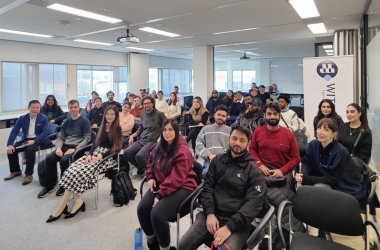Students Explore Solutions for Quality Education During Project Week

Activities Aligned with UN’s Sustainable Development Goal #4
From 16 to 18 December, more than 220 foundation, bachelor’s and master’s students participated in Wittenborg’s End-of-Year Project Week, themed after the United Nations’ Sustainable Development Goal (SDG) #4 (‘Quality Education’). The theme was chosen earlier this year by both students and staff, and it will serve as Wittenborg’s Theme of the Academic Year 2025. The initiative aimed to enable participants to create innovative business plans or solutions that promote quality education and lifelong learning.
The activities kicked off on 16 December at Apeldoorn’s traditional Orpheus Theatre, where Wittenborg president, Peter Birdsall, delivered the opening speech. The day also featured inspiring keynote sessions from Wittenborg Associate Professor, consultant and educator Colin McKenzie; Rector Ron Tuninga; and Associate Professor Ahmed Mehta. A panel discussion on the impact of AI in education followed, featuring Birdsall, Tuninga, Head of the School of Business Rauf Abdul and Assistant Professor Hind Albasry.
According to McKenzie, discussing themes like Quality Education is important for students because it enables them to make positive changes to society. “We are in the most international business school in the Netherlands, with people from many different nationalities who are sharing their experiences. In the world, there are lots of people who are not fortunate enough to get access to education and we need to consider them. The students who are discussing quality education here will be ambassadors when they go back to their countries, and they will be able to make change,” he said.

Ron Tuninga highlighted that events like these help participants understand that everyone has to give back to society. “We need to connect better with society and to have business students understand that there are more things than just making a profit. On top of that, this is a great opportunity for students and faculty to share experiences and help Wittenborg keep developing itself.”
On 17 December, students attended keynote sessions by Deputy Head of the School of Business, Dadi Chen; Wittenborg Professor and Vice-President Ad Kil; AI expert and researcher Jie Li; and sociologist, lecturer and researcher Iyeyinka Kusi-Mensah. The day ended with a practical workshop by Colin MacKenzie, focusing on collaborative strategies to tackle educational challenges.
Working in Groups
Students were divided into groups of four to five members. Unlike regular Project Weeks, where teams are typically culturally diverse, this time, teams were country-specific. This approach allowed students to select a target country that reflected the nationalities of the team members. The aim was to encourage students to apply cultural and contextual knowledge to create solutions tailored to the unique challenges faced by their selected country regarding ‘Quality Education.’
Each group was assigned one of the ten targets of SDG 4, such as ‘Free Primary and Secondary Education’, ‘Eliminate All Discrimination in Education’ and ‘Build and Upgrade Inclusive and Safe Schools’. The final product was a poster presentation, designed to meet the standards of a research or development project proposal. The posters were evaluated through a jury panel, with the top three teams announced at Wittenborg’s annual Christmas party on 18 December.

Each member of the winning teams – for both the bachelor’s and master’s competitions – will receive a € 100 Bol.com voucher. The groups in second and third place will receive € 50 and € 25 vouchers, respectively.
Hospitality Business Administration (HBA) student Arshia Baharloueiyancheshmeh, specialising in Sport Business Management, was part of the team that won first prize among the bachelor’s students. He highlighted the benefits the Project Week offered to participants. “I enjoyed the collaborative aspect the most. Working with a diverse group of peers allowed us to exchange ideas and perspectives, which enriched our project and made the process engaging and rewarding.”
Activities in Amsterdam
During the project week in Amsterdam, 83 bachelor’s and master’s students explored the theme of ‘Quality Education’, focusing on the application of Artificial Intelligence in personal and professional development. The activities began on 3 December with a keynote session by Dr Jie Li.
Bachelor’s students were tasked with interviewing professionals from various fields about their experiences using AI in personal and professional contexts. Each team will analyse the collected data and prepare a presentation, scheduled for 23 January, to share their findings.
Master’s students, on the other hand, were assigned to design workshops for bachelor’s students, teaching them how to use AI in their personal and professional growth. Each team worked with a specific tool, including platforms such as Perplexity, Wizco, Reclaim, Prezi AI, Slidebean, Jenni AI, Atlas.ti, Resume.io and Career Copilot. The workshops are planned for the end of January.
According to Associate Professor and Deputy Head of the School of Business, Dadi Chen, this project offers a unique opportunity to explore AI's transformative role in education and research while developing essential skills in training design, delivery and analysis. “We encourage students to approach this task creatively and collaboratively, with a focus on the practical application of AI tools in an academic context,” he emphasised.
WUP 30/12/2024
by Ulisses Sawczuk
©WUAS Press